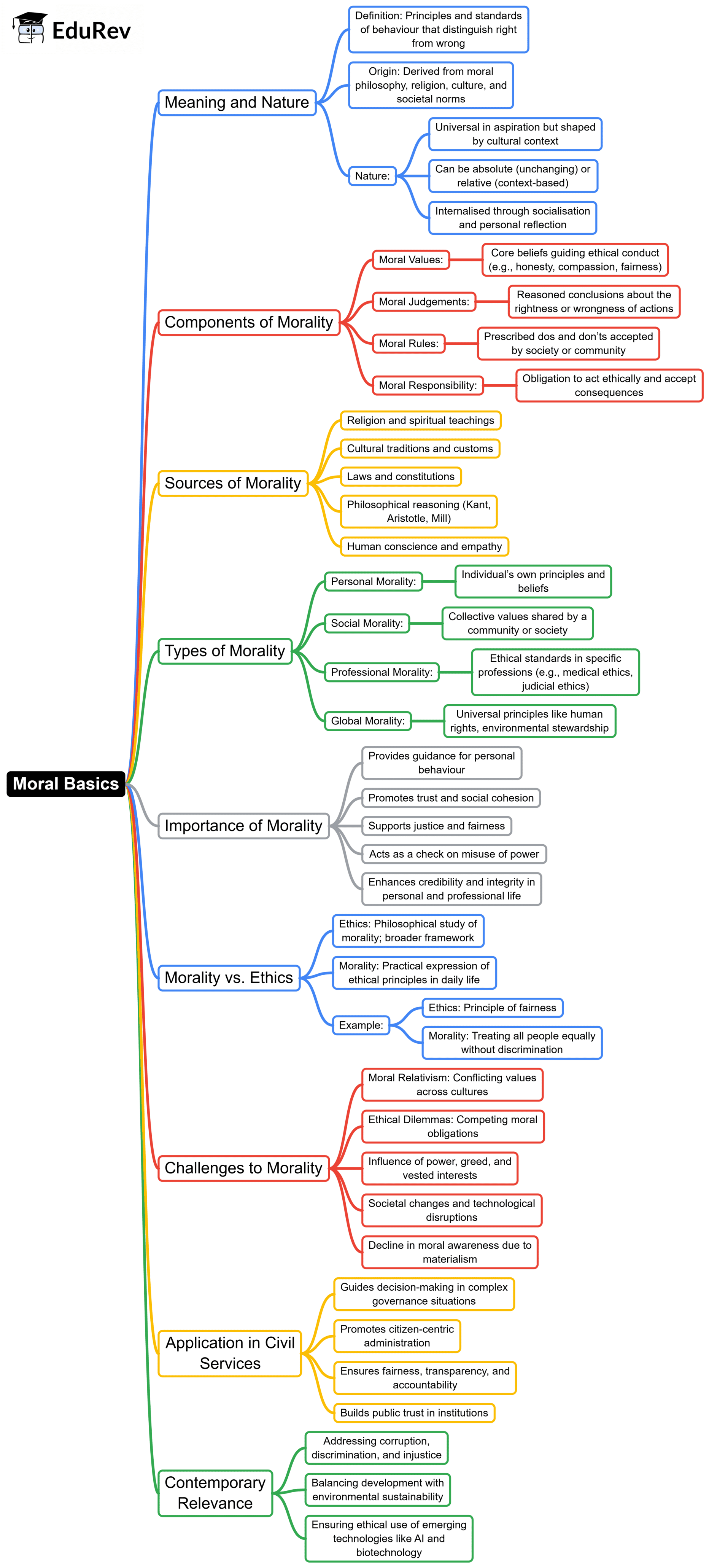UPSC Exam > UPSC Notes > UPSC Mains: Ethics, Integrity & Aptitude > Mind Map: Moral Basics
Mind Map: Moral Basics | UPSC Mains: Ethics, Integrity & Aptitude PDF Download

The document Mind Map: Moral Basics | UPSC Mains: Ethics, Integrity & Aptitude is a part of the UPSC Course UPSC Mains: Ethics, Integrity & Aptitude.
All you need of UPSC at this link: UPSC
|
78 videos|139 docs
|
FAQs on Mind Map: Moral Basics - UPSC Mains: Ethics, Integrity & Aptitude
| 1. What are the foundational principles of moral philosophy relevant to UPSC preparation? |  |
Ans. The foundational principles of moral philosophy include concepts such as utilitarianism, deontology, virtue ethics, and social contract theory. Utilitarianism focuses on the greatest good for the greatest number, while deontology emphasizes duties and rules. Virtue ethics centers around the character and virtues of individuals, and social contract theory discusses the legitimacy of authority and governance based on an implied agreement among individuals to form societies.
| 2. How can moral reasoning be applied in civil services decision-making? |  |
Ans. Moral reasoning in civil services decision-making involves evaluating the ethical implications of policies and actions. Civil servants must consider the consequences of their decisions on various stakeholders, adhere to principles of justice and fairness, and ensure accountability. By applying moral reasoning, they can navigate complex situations and uphold public trust, ensuring that decisions reflect both legal obligations and ethical standards.
| 3. What role does ethics play in governance and public administration? |  |
Ans. Ethics plays a crucial role in governance and public administration by guiding the behavior of public officials and institutions. It helps establish standards for integrity, transparency, and accountability, which are essential for maintaining public confidence. Ethical governance promotes equitable treatment of citizens, reduces corruption, and enhances the effectiveness of public services. It also fosters a culture of responsibility and respect for the rule of law.
| 4. How are moral dilemmas relevant to civil service exams like UPSC? |  |
Ans. Moral dilemmas are relevant to civil service exams like UPSC as they assess candidates' ability to navigate ethical challenges in public administration. Questions may present scenarios where candidates must weigh conflicting values or interests, requiring them to demonstrate critical thinking and ethical reasoning. Successfully resolving these dilemmas showcases a candidate's preparedness to handle real-world situations in governance.
| 5. What are the common ethical challenges faced by civil servants in India? |  |
Ans. Common ethical challenges faced by civil servants in India include corruption, nepotism, bureaucratic inefficiency, and conflicts of interest. Civil servants often grapple with pressures to conform to unethical practices due to systemic issues or political interference. Additionally, balancing personal values with organizational expectations can pose significant challenges, emphasizing the need for strong ethical frameworks and adherence to moral principles in their work.
Related Searches
















